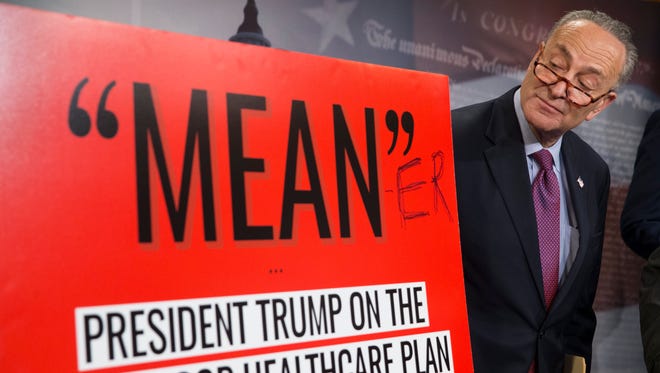Senate Democrats launch tactics to slow work on health care bill

WASHINGTON — After days of protesting GOP “secrecy” in crafting their health care bill, Senate Minority Leader Chuck Schumer of New York and other Democratic leaders began a strategy on Thursday of trying to slow down consideration of the proposal.
Their first steps were to get Republicans on record objecting calls for transparency. Senate Majority Leader Mitch McConnell of Kentucky turned down their requests for any changes to the House-passed Obamacare replacement to be public for 72 hours and be subject to a Congressional Budget Office analysis — though CBO is promising to release an analysis next week.
Ultimately, there’s not much Democrats can do to block the bill’s passage if enough Republicans fall in line, but they can make the process onerous. Democrats have been calling on the American public to weigh in against “Trumpcare.”
“Every American should be asking their Republican senators one simple question this weekend: Why do the wealthy deserve a tax cut more than we deserve health care?” Schumer said.
Republicans are using a budget procedure to pass the bill with a simple majority of 51 votes, rather than the 60 votes typically needed for legislation.
The rules allow Democrats — and Republicans — to offer unlimited amendments on the Senate floor next week, when it is expected to come up for a vote. But Democrats are effectively blocked from filibustering the bill.
The bigger obstacle for Republicans may be within their own party, with some conservatives saying the bill doesn't go far enough in repealing the Affordable Care Act and one moderate, Sen. Dean Heller of Nevada, saying he’s concerned about the impact of the bill on Medicaid patients. Democrats are united against it, meaning that McConnell can afford to lose only two GOP votes.
If the Senate passes its version, the House and Senate would have to settle on compromise legislation before it can be signed by President Trump.
Though Trump celebrated passage of the House version of the health care bill in May, he has since called it “mean” and said the Senate plan should have more “heart.” The House-passed health care bill, called the American Health Care Act, would lead to 23 million fewer people having health insurance by 2026, according to the Congressional Budget Office.
Read more:
Senate health care bill analysis: Despite risk, Republicans don't have a choice
Protesters gather in front of Mitch McConnell's office for 'die-in'
By keeping money for insurance subsidies, GOP health bill may lower premiums
Trump: Senate health care bill needs some negotiations
During a news conference, Schumer edited a “Mean” poster with a marker to make it say “Meaner.”
He said the Senate bill would raise health care costs for middle-class and working-class families, kick millions off Medicaid, abandon people with pre-existing conditions and defund Planned Parenthood, making it harder for millions of women to obtain health care.
“It’s every bit as bad as the House bill, in some ways even worse,” he said.
Regardless the outcome, there’s not much of a downside for Democratic senators to be seen by their base as fighting the bill as robustly as possible. The Progressive Change Campaign Committee is soliciting signatures for a petition, calling on Democrats to tie up the Senate with thousands of amendments to the bill.
"The longer it takes to get a vote on this bill, the more public scrutiny it will receive, the more time there will be for opposition to build, and the more likely it is that three Republican senators will get cold feet about voting for it," the campaign writes in an email to supporters.
Progressive icon, Sen. Elizabeth Warren, D-Mass., characterized the fight in stark terms: “These cuts are blood money. People will die.”
Democrats have been hammering Republicans this week on the Senate floor for a lack of transparency on their bill that was drafted behind closed doors, arguing that Democrats held about 100 hearings and meetings on the Affordable Care Act before its passage in 2010.
Democrats began their protest earlier this week by using procedural tactics to stall Senate business, forcing the postponement of committee hearings.
Contributing: Erin Kelly and Eliza Collins